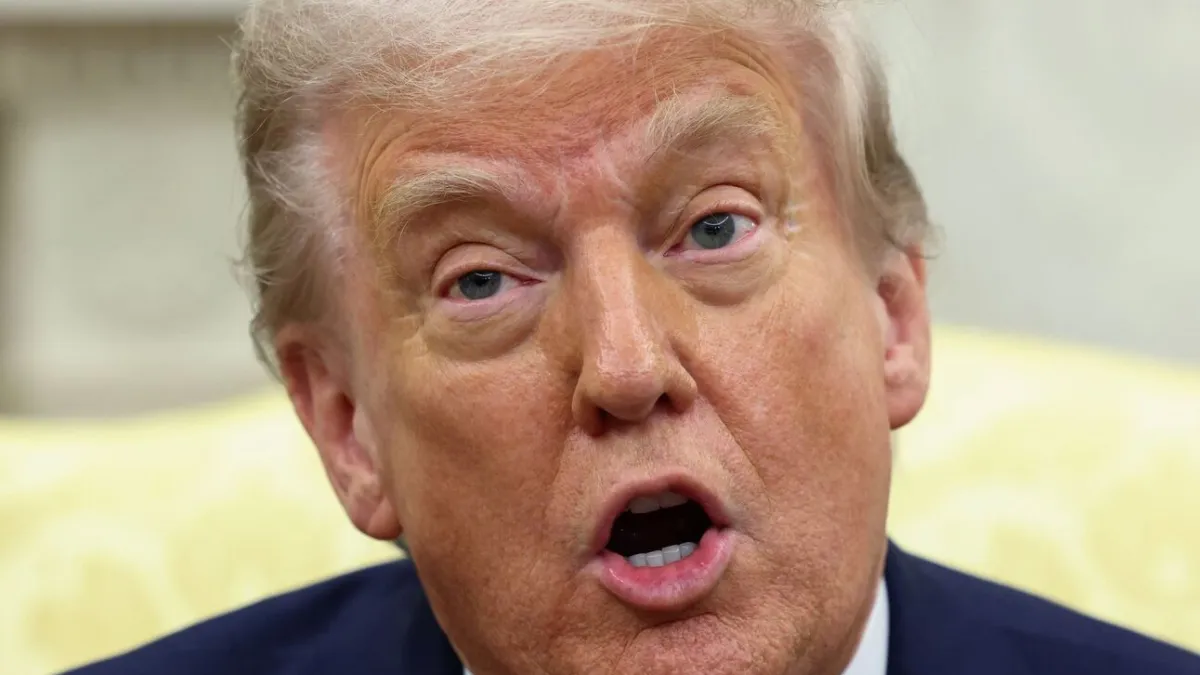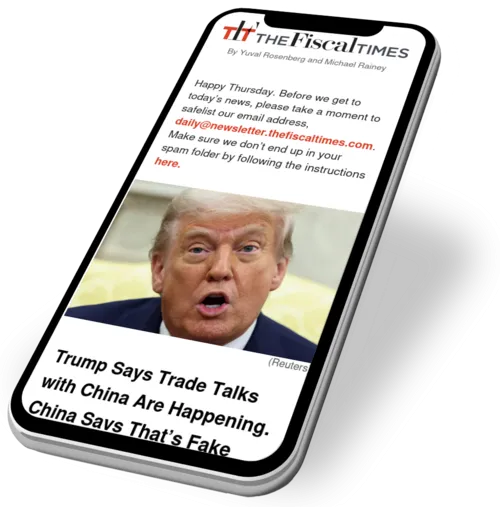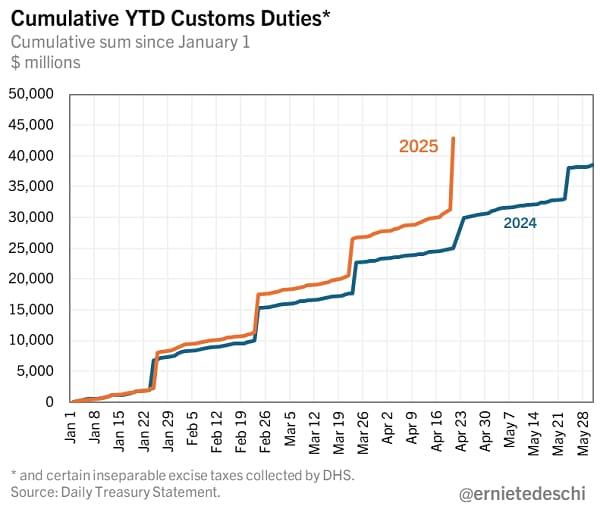China Says Trump’s Claim of Trade Talks Is Fake News

Happy Thursday. Before we get to today's news, please take a moment to safelist our email address, daily@newsletter.thefiscaltimes.com. Make sure we don't end up in your spam folder by following the instructions here.
Trump Says Trade Talks with China Are Happening. China Says That's Fake News
As the United States and China battle over tariffs and the fate of the global economy hangs in the balance, the two sides don't even agree on whether they're engaged in negotiations.
We will admit right up front that we're not necessarily experts on "The Art of the Deal," but that doesn't seem to bode well for an agreement any time soon.
President Donald Trump struck a notably more conciliatory tone regarding China yesterday. He told reporters that he would be "very nice" with Chinese President Xi Jinping and that the 145% tariffs he imposed on Chinese goods would come down substantially. He also said his administration was "doing fine" in negotiations with China and suggested that talks were active. China quickly responded: Nuh uh! To which Trump then said, Are so!
For the sake of journalistic accuracy, we should note that China's actual response wasn't quite so juvenile. "For all I know, China and the U.S. are not having any consultation or negotiation on tariffs, still less reaching a deal," a spokesman for China's Foreign Ministry reportedly said. And a Commerce Ministry spokesman added: "Any claims about the progress of China-U.S. trade negotiations are groundless as trying to catch the wind and have no factual basis."
The Commerce spokesman said China would be to dialogue based on mutual respect: "The unilateral tariff increase measures were initiated by the United States. If the United States really wants to solve the problem, it should face up to the rational voices of the international community and all parties at home, completely cancel all unilateral tariff measures against China, and find ways to resolve differences through equal dialogue."
Asked about China's denial, Trump insisted that talks were happening. "They had a meeting this morning," he said. Pressed for information on who was involved, he declined to provide any details, saying, "it doesn't matter who they is. We may reveal it later, but they had meetings this morning, and we've been meeting with China."
The bottom line: As markets wobble and concerns grow that Trump's tariffs will lead to empty store shelves and a possible recession, there's little indication that the Trump administration will be striking a quick trade deal with China. Beijing has vowed to fight to the end and is working to keep other countries from siding with the United States. Trump's recent retreat, meanwhile, may not provide much certainty after months of upheaval.
"China called Mr. Trump's bluff and seems to have won this round," The Wall Street Journal's pro-business editorial board wrote Wednesday evening. "The question going forward is whether Mr. Trump is internalizing these economic and political lessons or merely pausing to fight his trade war another day. We doubt even Mr. Trump knows the answer, since so much of his decision-making is ad hoc. He'll keep his universal 10% tariff in any case."
Chart of the Day: Tariff Revenues
President Trump has claimed that tariffs will generate enormous revenues for the country, so much so that they could potentially replace the income tax and pay off the national debt. "America is going to be very rich again, very soon," he said earlier this month as he extolled the virtues of 19th-century fiscal policies.
Economists have expressed serious doubts about the benefits of Trump's trade war, while pointing out that tariffs are essentially a tax on imports paid for by U.S. firms and consumers, so not really a source of new wealth. But the basic idea - that higher tariff rates mean higher tariff revenues - is sound, at least up to a point, and the latest revenue data from the Treasury is starting to bear that out.
Ernie Tedeschi, director of economics at the Yale Budget Lab, shared a chart on social media Thursday that indicates that tariff revenue is starting to move noticeably higher. "Monday's custom duty deposit to Treasury from CBP was $11.7 billion, almost $7 billion higher than the April 2024 deposit," Tedeschi wrote, referring to U.S. Customs and Border Protection, which collects tariffs at ports of entry. "Suggests that tariffs were biting in April in a way they weren't in February or March."
We don't know how much higher that number could go, but $7 billion more per month would translate to about $84 billion a year - far from the amount needed to replace the income tax or make a dent in the national debt. And if the trade war continues, the number could actually fall as imports drop dramatically, wiping out any revenue gains.
Based on preliminary data, Tedeschi estimated that the effective tariff rate for April would be about 5.5%. If that holds, it would be the highest tariff rate since 1972.
Courts Block Trump Attempts to Deny Funding for Schools, Cities
Federal****courts on Thursday blocked efforts by the Trump administration to cut funding for schools that operate programs focused on diversity, equity and inclusion, and for cities that don't cooperate with federal immigration enforcement efforts.
In response to a lawsuit brought by the National Education Association and the American Civil Liberties Union, a federal judge in New Hampshire blocked orders given by the Trump administration that target what the U.S. Education Department has called "illegal DEI practices" at schools.
In February, the department said that it would use civil rights laws to punish schools that differentiate people based on their race; any schools that continue to do so were threatened with litigation and a potential loss of federal funding. Schools faced a Thursday deadline to certify that they were complying with the new rule.
Noting that the federal government has not defined what a "DEI program" is, U.S. District Court Judge Landya McCafferty agreed with the plaintiffs that the orders were "unconstitutionally vague." In an 82-page ruling, McCafferty also said the "right to speak freely and to promote diversity of ideas and programs is ... one of the chief distinctions that sets us apart from totalitarian regimes. In this case, the court reviews action by the executive branch that threatens to erode these foundational principles."
Later in the day, in response to a suit by plaintiffs including the American Federation of Teachers and the American Sociological Association, a federal court in Maryland issued an order with the same effect. "This Court takes no view as to whether the policies at issue here are good or bad, prudent or foolish, fair or unfair," wrote U.S. District Judge Stephanie A. Gallagher. "But this Court is constitutionally required to closely scrutinize whether the government went about creating and implementing them in the manner the law requires. The government did not."
Targeting sanctuary cities: Separately, a federal judge in California blocked an effort by the Trump administration to deny funds to cities and counties that it accuses of interfering with the enforcement of immigration policies - so-called sanctuary cities.
Ruling in a lawsuit brought by San Francisco, Santa Clara County and 14 other cities, U.S. District Judge William H. Orrick of the Northern District of California emphasized that power over spending is constitutionally controlled by Congress.
Referring to executive actions signed by Trump and a memo written by Attorney General Pam Bondi on her first day on the job, Orrick ruled that the administration's orders to "executive agencies to withhold, freeze, or condition federal funding apportioned to localities by Congress, violate the Constitution's separation of powers principles and the Spending Clause."
Orrick took the same approach in 2017 when he issued a similar order during the first Trump administration.
Fiscal News Roundup
- Hounded by Wall Street, Trump Tempers His Populist Rhetoric – Politico
- Trump, Johnson Squelch Talk of Tax Hike for Wealthiest Americans – Politico
- House Republicans Face Dilemma Over Medicaid Cuts as They Vow to Protect Benefits – CBS News
- Justice Department Axes Hundreds of Grants That Help Crime Victims and Fight Opioid Abuse – CNN
- Tariffs Will Hit Low-Income Americans Harder Than Richest, Report Says – Bloomberg
- As Trump Softens His Tone on the Trade War, China Refuses to Budge – Washington Post
- China Tells Trump: If You Want Trade Talks, Cancel Tariffs – BBC
- Xi Is Ratcheting Up China's Pain Threshold for a Long Fight With Trump – Wall Street Journal
- Trump Meets His Match: The Markets – Wall Street Journal
- Trump's Trade Whiplash Sinks World Into Dreaded 'Uncertainty' – Bloomberg
- Judge Blocks Parts of Trump's Overhaul of US Elections, Including Proof-of-Citizenship Requirement – Associated Press
- Trump Science Cuts Roil University Labs, Targeting Bird Feeder Research, AI Literacy Work and More – Associated Press
- Elon Musk Had the Government in His Grasp. Then It Unraveled – Washington Post
- How DOGE Plans to Plow Ahead Without Musk at the Helm – Wall Street Journal
- Once All-Powerful, Pharma's Allies in Washington Are Fleeting – Politico
- Millions of U.S. Measles Cases Forecast Over 25 Years if Shots Decline – Washington Post
- Americans Unsure What to Believe About the Measles Vaccine, Poll Shows – Washington Post
- Trump's Meme Coin Soars as President Offers Dinner to Top Holders – Fox Business
- Are Things Falling Apart for Trump? – Aaron Blake, Washington Post
- 'The Art of the Deal' Meets Global Reality – Stephen Collinson, CNN
- Is This Trump's Mitterrand Moment? – Wall Street Journal Editorial Board
- Trump Is Facing Six Wars, and He's Losing All of Them – Hal Brands, Bloomberg
- Jerome Powell's Oh So Lucky Trade War – Joseph C. Sternberg, Wall Street Journal
- Elon Musk's Lack of Math Skills Is Making Me Nervous – David Von Drehle, Washington Post
- Reagan's 1982 Tax Hike Is a Cautionary Tale for Trump – Kenneth L. Khachigian, Wall Street Journal
- Why Trump's 'Deportation Regime' Is Actually Not Going Well – Patrick Healy and Lydia Polgreen, New York Times
- While Gutting USAID, Marco Rubio Quietly Saved Cuban Regime Change Programs – Daniel Boguslaw, American Prospect
- It's Not Hard to See Through RFK Jr.'s 'Radical Transparency' Pledge – Peter Lurie, Aaron Kesselheim and Joshua Sharfstein, Washington Post
- RFK Jr. Is the Real Wild Card in Protecting Obamacare – Lisa Jarvis, Bloomberg
- Meet the Top Donors to Trump's $239 Million Inauguration Fund – Clara Ence Morse et al, Washington Post

